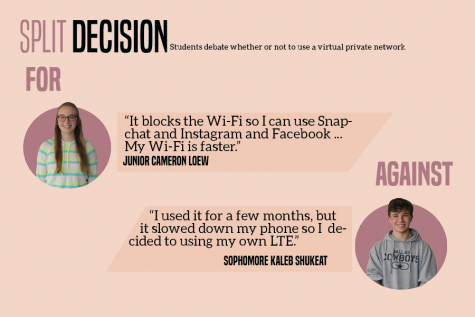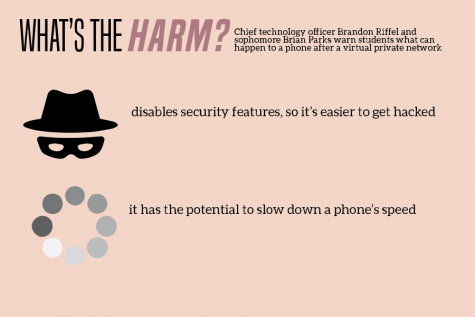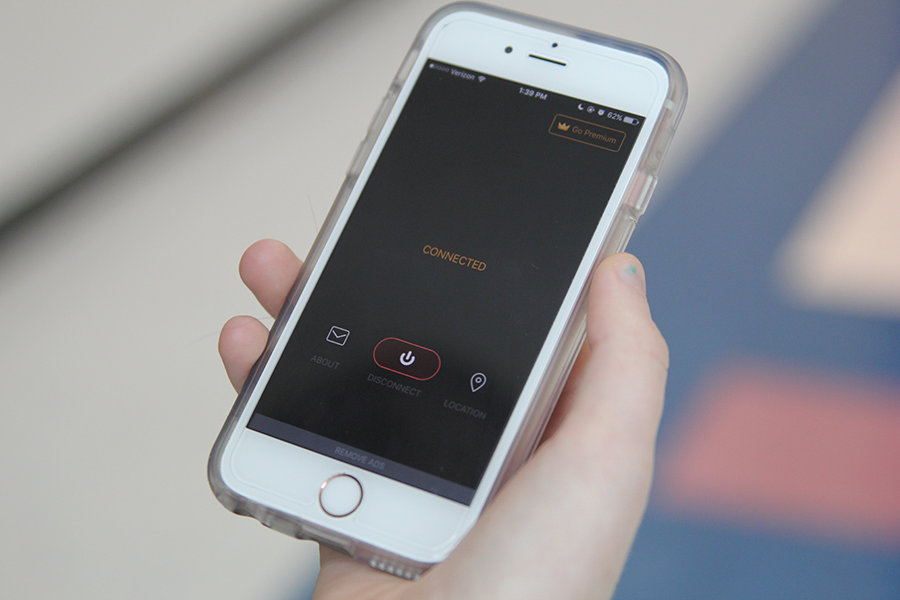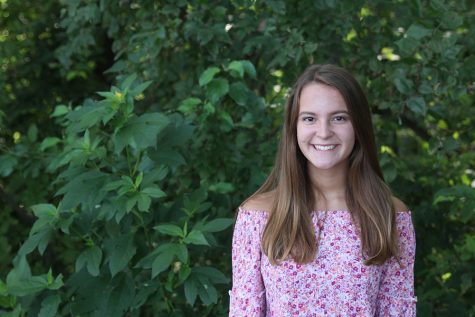Community evaluates the virtual private networks controversy
Students, staff and administration share their opinions on using VPNs, virtual private networks, to get around firewalls
Students often use VPN to bypass restrictions on school Wi-Fi
April 15, 2017
A student walks into school, looking down at her phone. As the phone connects to the school’s Wi-Fi, social media apps like Snapchat and Instagram can no longer be used. As a solution, she turns on her VPN, or a virtual private network, on her phone.
Sophomore Brian Parks, a student who uses a VPN on his phone at school, has been familiar with technology from a very young age, and VPNs specifically since he was ten.
Parks says the purpose of a virtual private network is to protect the user’s privacy and prevent them from being spied on by other users.
“[VPNs] make a tunnel from the network you are on to a different network, and bypasses any firewall or security that the network has on it,” Parks said.
While the intended purpose of VPNs may have been to protect the user’s privacy, chief operational technology officer Brandon Riffel believes students are using the apps for a purpose other than what they were built for.
“I think most [students] are just trying to get past the web content filter,” Riffel said. “I mean there are a few I’m sure that are trying to protect their privacy, but I think most are just trying to get to something, not necessarily because they are trying to do something unacceptable… [but] I think just part of [students] everyday life is using social media.”
Junior Vanessa Harlow also believes students use VPNs so they can use apps blocked by the school Wi-Fi.
“[VPNs] work pretty well when there is no service,” Harlow said. “You can turn the Wi-Fi on and go on Snapchat. … [Students use them] so they can still be on the Wi-Fi and use Snapchat, Instagram and Twitter.”
The reason the district has certain restrictions on the school Wi-Fi, according to Riffel, is to protect students from cyberbullying. In addition, it’s to make sure students are using their technology at school appropriately.
“Students’ parents expect [the administration] to block those things because all they’ve heard is the bullying and bad things that can happen, but it’s a work in progress and it always will be,” Riffel said.
The use of VPNs while at school is forbidden, according to the current 2017 Acceptable Use Policy. However, according to Riffel, because too many students use a VPN the district has never punished a student for using one.
“We have not one time enforced the acceptable use policy on VPN use,” Riffel said. “The easy way for me to enforce that is if I see VPN traffic, those users get blocked.”
As VPNs grow in popularity, so does the controversy surrounding them. While many students accept the fact VPNs work, there is little concrete information on the actual effects the apps have on students’ phones. For this reason, sophomore Zach Steiger chooses not to use VPN.
 “Their software is designed to use history on your phone,” Steiger said. “In the terms and conditions it says they can use any data on your phone that they like.”
“Their software is designed to use history on your phone,” Steiger said. “In the terms and conditions it says they can use any data on your phone that they like.”
Until recently, teachers were not affected by the school firewall restrictions. However, English teacher Anna Nelson resorted to downloading a VPN on her school laptop when a blocked website stood in the way of her lesson plans.
“I thought it just wasn’t working, but my class thought it was being blocked, and they said put this VPN on there and it will work,” Nelson said. “So I installed it and it worked but I haven’t really used it too much since.”
In the future, Riffel believes there needs to be a more open discussion between students, parents and administration to address a policy that he believes needs to be changed.
“I know that the policy we have now where we don’t allow most social media is pushing students to find other ways to get to their social media,” Riffel said. “I think education and communication needs to happen [and] part of that communication and discussion is going to be why are students using it and is there another way we can facilitate the things [students] need to do without being risky.”
Ultimately, Parks believes that while VPNs serve a purpose, students should still be aware of what they are putting on their phones.
“Truly they won’t have much of an affect on them except porting through a different network,” Parks said. “If they were to install a VPN that someone purposely developed that also has a virus on it, it could cause problems for them … but it will get around restrictions. As long as you know exactly what it does, then go ahead.”












Erikkorsh • Apr 17, 2017 at 3:08 pm
In my opinion VPNs are a need of the hour whether you like it or not. They have proved their mettle inside out. And yes, if you go for software providers which doesn’t have any reputation in the market surely you’re going to be making the wrong trade. My suggestion would be to go choose a VPN from a reputable source https://goo.gl/Li6Z14 because a lot of VPN apps on Android or iOS are from unknown publishers and will cause harm more than good. One thing is for certain that VPNs are here to stay and even advisable by top security experts around the world.